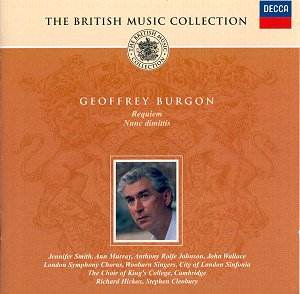The two works featured on this disc are symbolic of
two aspects of Geoffrey Burgon's composing career. The Requiem
represents the ambitions of the serious composer while the Nunc Dimittis
sums up the extraordinary success Burgon has had as a composer of TV
signature pieces and film music. The Nunc Dimitis may be only
a three-minute filler but, together with the music Burgon wrote for
the Brideshead Revisited TV serial, it is his most famous work.
Played at the end of each episode of the early '80s TV adaptation of
John le Carré's Tinker, Tailor, Soldier, Spy, it was,
if I recall correctly, accompanied by shots of Oxford’s 'dreaming' spires.
The music has a dreaming quality as a boy's treble voice floats ethereally
over slow moving, sparse textures. On this disc the 1996 recording,
with Stephen Cleobury in charge of the Cambridge King’s College forces,
is effectively atmospheric and Thomas Hopkinson's treble is certainly
more idiomatic than a version made with soprano Lesley Garrett.
Hickox has recorded the Nunc Dimittis in his
time but here tackles the meat of the disc. It was the Requiem that
launched Burgon's career as a 'serious' composer with its successful
premiere at Hereford Cathedral in 1976. It is a work very much of its
time, mostly from the ‘blocks of textured sound’ school. However, Burgon
eschews some of the more taxing compositional procedures then in vogue
and has the courage to employ major and minor triads which, retrospectively,
almost makes the work seem forward looking what with the likes of John
Adams on the horizon. Although written when he was over thirty, it can
be regarded as an early work for Burgon came to full time composition
quite late, switching from a career as trumpet player (an instrument
that features prominently in his work – witness the Nunc Dimittis).
As such, it is extraordinarily assured in the way the orchestral,
choral and solo forces are handled.
The same can be said of Hickox in respect of his control
of the performance. There is a palpable sense of commitment from all
concerned in this recording from twenty years ago, issued here as part
of Decca’s new British Music Collection. It is difficult to imagine
a more effective rendering. Jennifer Smith, in carrying the lion's share
of the solo work, is magnificent in negotiating the vertiginous wide
leaps of the soprano part. Of the other two distinguished soloists,
Ann Murray confidently tackles what was originally conceived as a male
role (although she is no stranger to the interpreting of male castrato
and counter tenor roles in the opera house). Anthony Rolfe Johnson displays
the authority you would expect from someone who pioneered his part at
the premier five years earlier.
The recording sounds extremely well, coping effectively
with the contrasts between the pianissimo etherealisms of the opening
to the thunderings of the Dies Irae. In the latter, the antiphonal
dialogue between the two kettle drums is stereophonic excitement at
its finest.
Finally, you may wonder why a Nunc Dimittis appears
on its own, shorn of a preceding Magnificat. Well it was written as
a stand-alone but after the event Burgon was persuaded to write a companion
Magnificat. Some thought the new addition stood stylistically uncomfortably
with its partner, and although Decca could easily have squeezed it in
(the disc is not generous in 'music minutes') maybe the Nunc Dimittis
is best heard in its originally conceived form.
John Leeman


